Editor's note: This story first appeared in the April 15, 2013, issue of Marine Corps Times.
MARINE CORPS RECRUIT DEPOT PARRIS ISLAND, S.C. — The images stay with you for the rest of your life: Screaming drill instructors, in your face, in your space, in your nightmares.
All enlisted Marines are united by memories of the drill instructors who barked orders at them — morning, noon and night — for the first 13 weeks of their Marine Corps lives. They share the remembrances of dread when they incurred their DI's wrath. They know what it's like to fumble around trying to follow the simplest of orders, but be paralyzed with confusion and fear in the face of so much pressure and heat.
Boot camp is a rite of passage in which drill instructors forge recruits' identities as Marines. The DIs break them down, teach them how to follow orders and how to dress, speak and act like Marines. They teach them Marine Corps culture, heritage and traditions. The process creates a special bond, a love-hate relationship that the recruits will remember for the rest of their lives.
Those drill instructors have secrets, though. Like any other community in the Corps, its members have a shared bond and tricks of the trade that have been handed down for generations. Recruits don't hear about them at boot camp - not where it's likely that you'll get smoked with incentive training for simply asking a dumb question.
Under the wide brims of smokey hats, the perfectly squared-away uniforms and almost caricature-like demeanors are noncommissioned officers and staff NCOs from a wide range of military occupational specialties. They decide, often with some trepidation, to return to boot camp to fill a special-duty assignment.

Sgt. William Loughran encourages recruits at during physical training at Marine Corps Recruit Depot Parris Island, S.C. Roughly 20,000 recruits pass through Parris Island annually.
Photo Credit: Cpl.Caitlin Brink/Marine Corps
Make no mistake: these Marines are playing a role. At its best, it's masterful performance art, but with a twist — the tremendous personal responsibility they feel for building raw recruits into disciplined Marines. Despite their gruff, borderline hostile interaction with recruits, DIs are real people with real emotions and tremendous dedication to molding young lives.
Marine Corps Times was afforded access to drill instructors at Marine Corps Recruit Depot Parris Island, South Carolina, recently to find out some of the secrets behind successful drill instructors.
Here are 11 things drill instructors never want their recruits to know:
11. Boot camp elicits flashbacks.
Marines who come to drill instructor school have about a week of administrative processing before they start their classroom tasks - and they need that time to adjust, said Maj. Chad Craven, director of the East Coast DI school based here. The place has that kind of effect on them. Battle-tested sergeants, staff sergeants and gunnery sergeants re-enter the boot camp environment and regress to semi-recruit mode, he said.
"Now wait a second," Craven said he tells his students. "You've been shot at, you've been IEDed, you've been shelled, you've gotten married and have been there for the birth of your child, yet you stand here saying 'good morning' when it's obviously the middle of the night."
Sgt. Nicholas Lanier, a senior DI who recently wrapped up his three-year tour and headed to 3rd Battalion, 1st Marines, at Camp Pendleton, California, said going back to boot camp was a huge adjustment.
"Driving back to Parris Island was very, very odd," the infantry rifleman said. "I definitely thought I was going to get screamed at and then everyone was so nice."
10. The 'frog voice' is real.
Drill instructors literally scream so hard at recruits that they can pass out, give themselves hernias, or do serious and permanent damage to their vocal chords. That's why they spend a lot of time at DI school learning to project from their diaphragms.
Even so, most DIs develop that raspy "frog voice." Losing their voice is inevitable, especially during the first phase of boot camp when orders are constantly barked. But at school, they try to teach new DIs how to prevent voice problems turning into something permanent, Craven said.
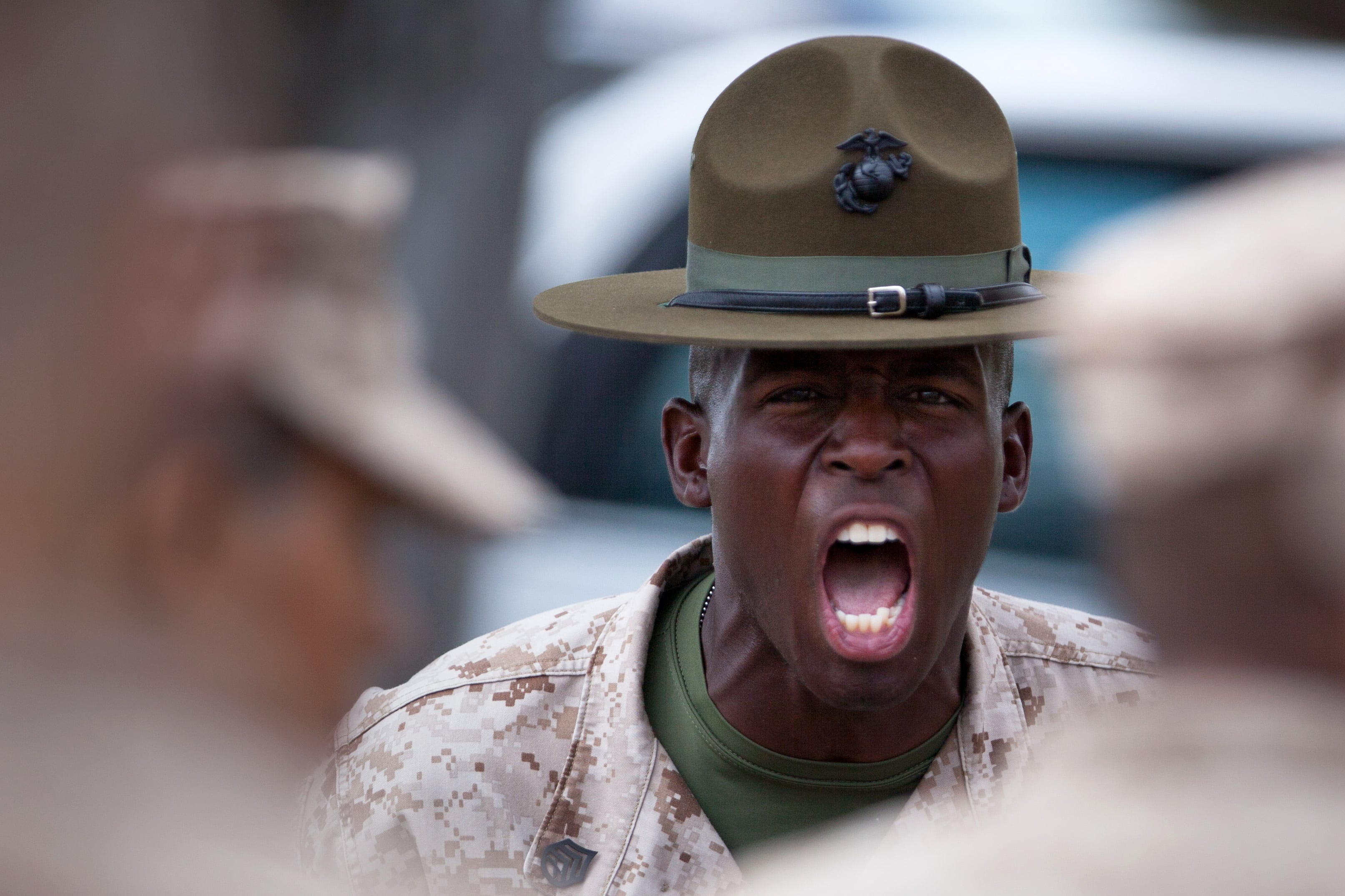
Staff Sgt. Antonio Curry, a drill instructor at Marine Corps Recruit Depot San Diego, barks out orders to his platoon of fresh recruits.
Photo Credit: Sgt. Kuande Hall/Marine Corps
Still, they need to speak loudly enough for about 100 recruits to hear them, and that requires practice. Schoolhouse instructors will stand a set number of paces away from the Marines as they learn to project their voices, he said.
While they do lose their voices on occasion, they have become masters at getting it back fast. Craven said the treatment is similar to soothing a sore throat, including hot water with honey and lemon. But Sgt. Melissa Sandoval, a DI with 4th Recruit Training Battalion here, said some DIs get a little more creative.
She drinks hot tea followed by a cold drink, she said. But she has also tried pickle juice or lime juice mixed with salt.
"It's something about the vinegar or the acid in the lime juice," she said. "It helps the lining of the throat."
9. Laughing on the inside.
The screaming that recruits must endure might actually be masking a different reaction: laughter. Drill instructors think recruits do and say some pretty funny things.
Lanier said he was tempted to laugh nonstop while on DI duty.
"It's just the things recruits say," he said. "They'll think they're saying something so serious, but it'll come out so ridiculous and you just want to laugh."
Instead he'd scream at them for doing or saying the wrong thing.
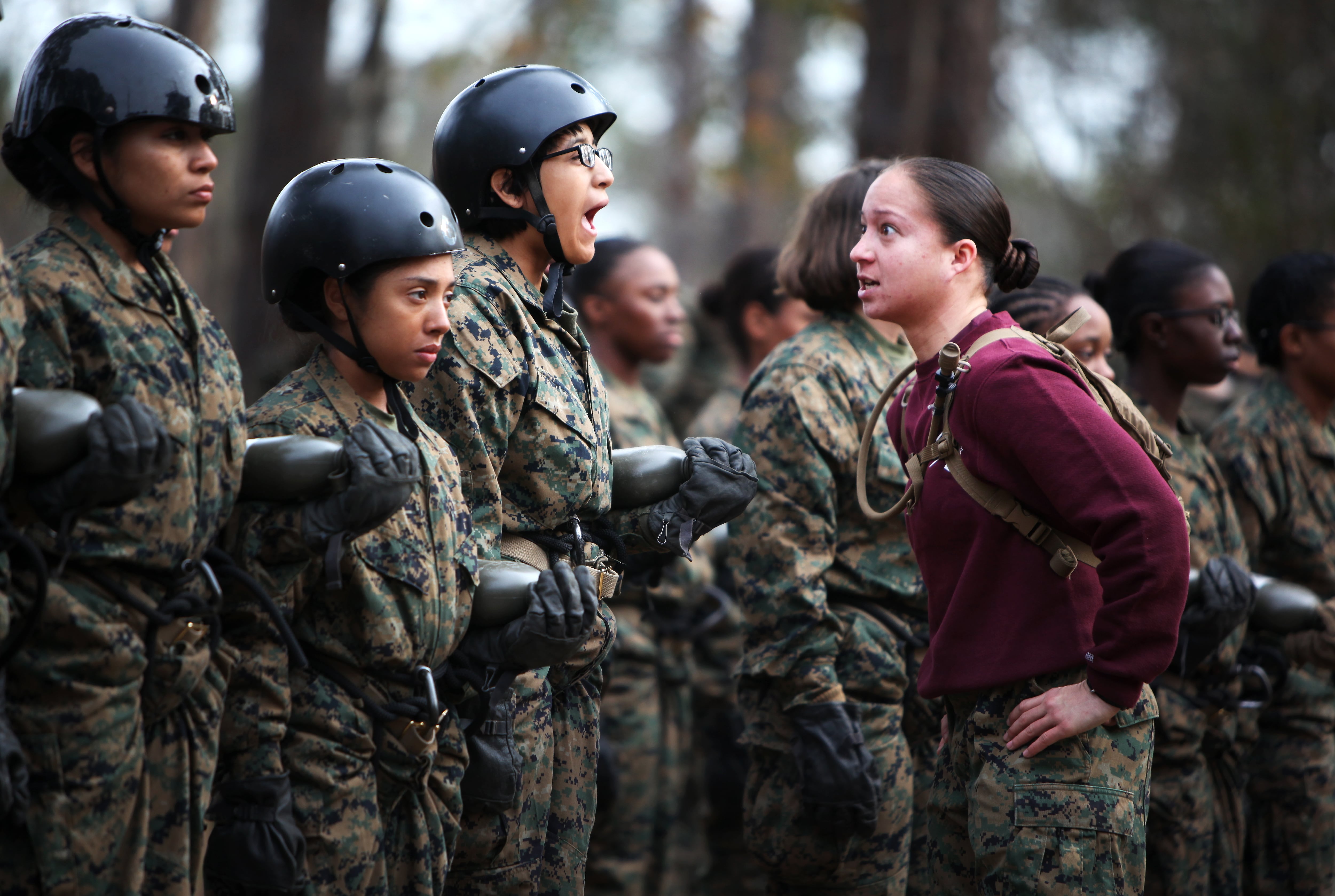
Sgt. Angela Arounerangsy, a drill instructor with 4th Recruit Training Battalion, motivates recruits as they prepare for the rappel tower at Marine Corps Recruit Depot Parris Island, S.C.
Photo Credit: Lance Cpl. Rodion Zabolotniy/Marine Corps
Sandoval agreed and said she had to stop herself from laughing all the time.
"Recruits do crazy stuff, we'll put it that way," she said. "And sometimes you just shake your head. You have to just breathe and think of something else."
Staff Sgt. Juan Rocha, a drill instructor with 1st Recruit Training Battalion at Marine Corps Recruit Depot San Diego, said he's too busy to even think about laughing in the moment, but he and other DIs will swap funny stories about recruits later.
8. They channel their own DIs.
Putting on the belt and campaign cover transforms a regular Marine into someone he or she probably feared as a new recruit. Once they're in that role, however, they realize how much time and dedication their own drill instructors devoted to the job.
"I remember how perfect they were in my eyes," said Sgt. Richard Kennedy, a San Diego DI with 3rd Recruit Training Battalion. "I hope I'm as perfect in my recruits' eyes as they were in my eyes."
Sgt. Jennifer Thiroux with 4th Recruit Training Battalion here, said she recalls the way her DIs' hair was always perfect and the way they walked and talked. She does the same things now to set a similar lofty example.
Drill instructors also rely on each other to see what works and what doesn't, Rocha said. He'll pick up some of the language and phrases that other DIs on his team use if they're effective.
7. They miss their families.
Getting home at 2300 and heading back out to start the next day, sometimes as early as 0300, doesn't provide a lot of time to be with loved ones. There is a family readiness program here to help Marines and their dependents get through those three years.
Dependents can tour the DI schoolhouse here and see what their Marines will be called on to do over the course of their duties.
"We knew it was long hours," said Gunnery Sgt. Richard Brennan, a senior DI here with 3rd Recruit Training Battalion. "But sometimes it's harder because — while I'm not in Iraq or Afghanistan and she knows I'm safe — I'm still gone, and it's an adjustment for the spouses. They always want you there."
The schedule is demanding, he acknowledged. After running and screaming all day, he'll go home to his kids playfully smacking him in the face while he falls asleep at the dinner table.
The key, he said, is to approach the situation as a team. It's imperative to talk to your spouse about what you're going through, he said. Sometimes he dreams about boot camp and yells in his sleep for his wife to "get on-line," the same thing he's been telling recruits all day. It is important for her to understand what his life is all about.
"I think it'll help to lead to a successful tour here without distraction, and it's good for the relationship," he said.
6. What they wish they had known.
Marines considering drill instructor duty should know it's physically and mentally demanding. Most said they lose weight during the tour; they're constantly on their feet and running with recruits.
"I wish I would've known that," Lanier said. "I really had never felt tired or sore or anything like that. You hear it, but you can tell someone all day long you're going to be tired, you're going to be this, but you never know until you get there."
It's also important to recognize that you're leaving your own MOS, a skill in which you are proficient, and picking up something entirely new, Sandoval said.
"You're learning," she said. "The more you train and do the new MOS, the better you'll get. You can't expect so much from yourself."
As a senior drill instructor, Brennan said it's his job to look out for other drill instructors. Just like recruits, drill instructors might not know their limits, he said, so he makes sure they don't overdo it.
5. They're turning you into a Marine.
Some Marines who hear about the addition of core values discussions and foot-locker mentoring say that boot camp should be more physically demanding. But drill instructors say their main job is not to prepare Marines for combat. Their job is turning civilians into Marines, and there's a specific process that has to occur in order for that to happen in a 13-week period.
The core values discussions help to establish a baseline from which all new recruits can adopt the Marine Corps way, Brennan said.
"There are kids who came up in areas that have no values, and to them, stealing or taking things that didn't belong to them was acceptable," Brennan said. "Others already came here with those values instilled, but we still have to find that baseline to bring them together."
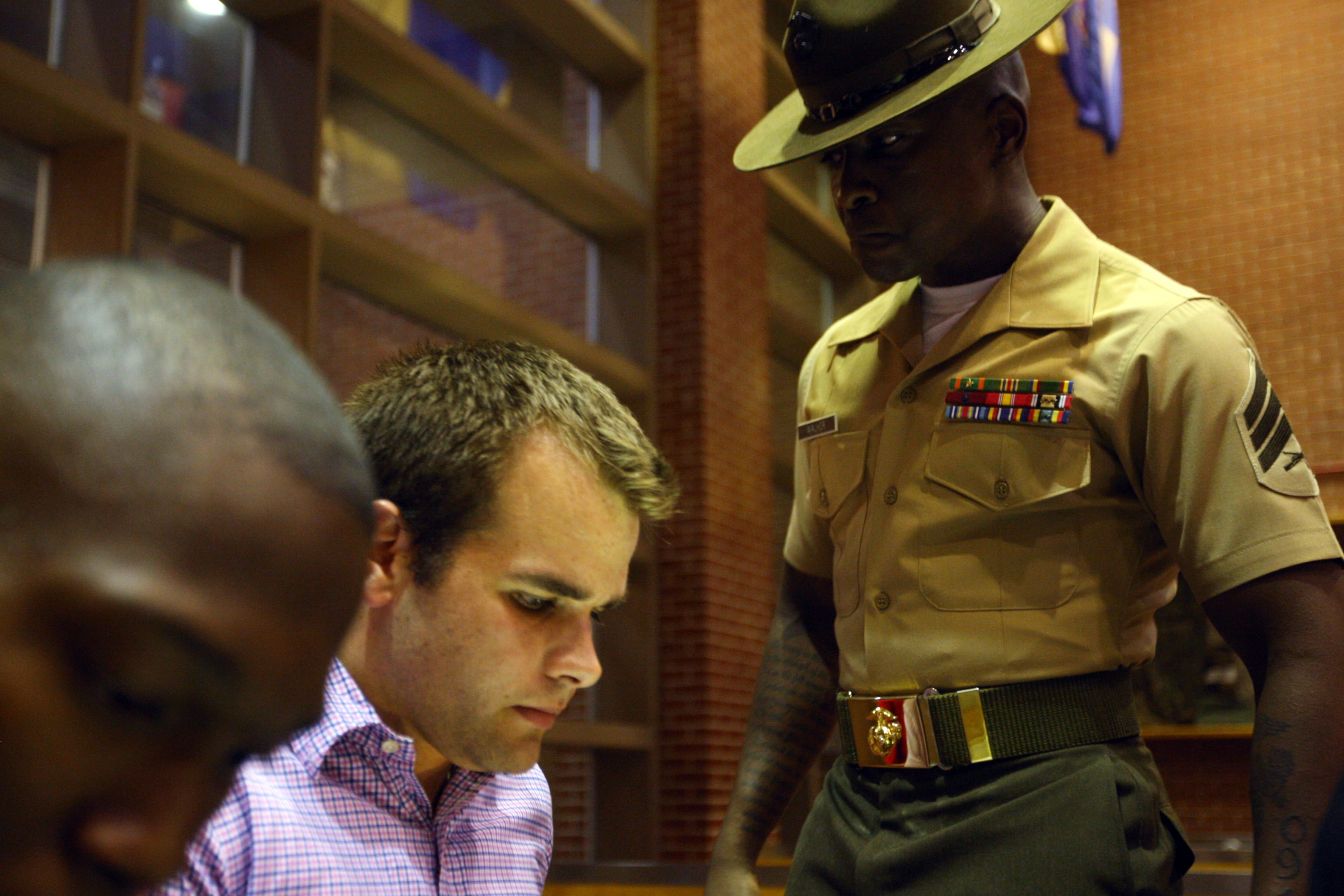
Sgt. Kadeem Walker glares at a recruit during receiving at Marine Corps Recruit Depot Parris Island, S.C. Recruits receive some of their first orders when they first arrive at the recruit depot during the receiving process.
Photo Credit: Lance Cpl. Octavia Davis/Marine Corps
As a senior drill instructor, responsible for more of the values-based training, he said he has to find the best way to reach them all.
"I was an inner city kid, and now I'm dealing with a kid from the mountains, I'm dealing with a kid who came from the country," he said. "You've got to find it, you can't just try one way, you have to expand your horizons."
4. Squared away for a reason.
One of the primary lessons Marines in drill instructor school learn is that recruits will always be looking at them as they set the example of what it looks like to be squared away.
If they get sweaty or even the slightest bit of dirt on their uniforms, they should be going to change, Kennedy said.
"I have four copies of every uniform ready to change into at any moment," he said. "So if I go out and get a little dirty, I can go, change and come back out in 30 seconds."
Sandoval said in 4th Training Battalion there are about 64 recruits. About 60 of them will be doing what they should be most of the time, she said. But there will always be that one recruit looking around to see what the drill instructor is doing, so they must always know their appearance is on display.
Craven said he tells Marines at DI school not only to check their own uniforms regularly, but to look at each other as well.
"If you have a sloppy looking drill instructor in front of you, then over time that recruit — that future Marine — is going to say, 'Oh, I guess it's OK for me not to square away my uniform, I guess it's OK for me not to look like a poster boy Marine.' "
It's nothing but a basic Marine Corps standard, Craven added — not an artificial standard they create at the depots.
3. Combat-tested teachers.
Instead of relying on stories about Vietnam or Korea from past generations, the current crop of drill instructors can tell their recruits what it's like to be in combat, based on their own experience, and why it's important for recruits to learn a skill that could someday save their lives.
Sandoval said that became clear during the Crucible, the three-day-long final test in boot camp. When they did a night movement, recruits saw what she meant when she said any illumination could alert the enemy to their position. And during simulated gunfire, the recruits understood why they had to speak loudly.
"One recruit was trying to get the attention of another recruit who couldn't hear her over the sounds of grenades and shooting," Sandoval said. "So she said, 'Now I know why they're always telling us to scream.'"
2. They love ITing you.
Aside from their voice, drill instructors say incentive training is one of the most effective tools they have at their disposal when they need to get their point across to a stubborn recruit.
Not only does the repetition of the exercise help recruits learn, Rocha said, but they'll work harder in the future just to avoid it.
When DIs throw values-based training into the mix, that's when real learning begins, Thiroux said.
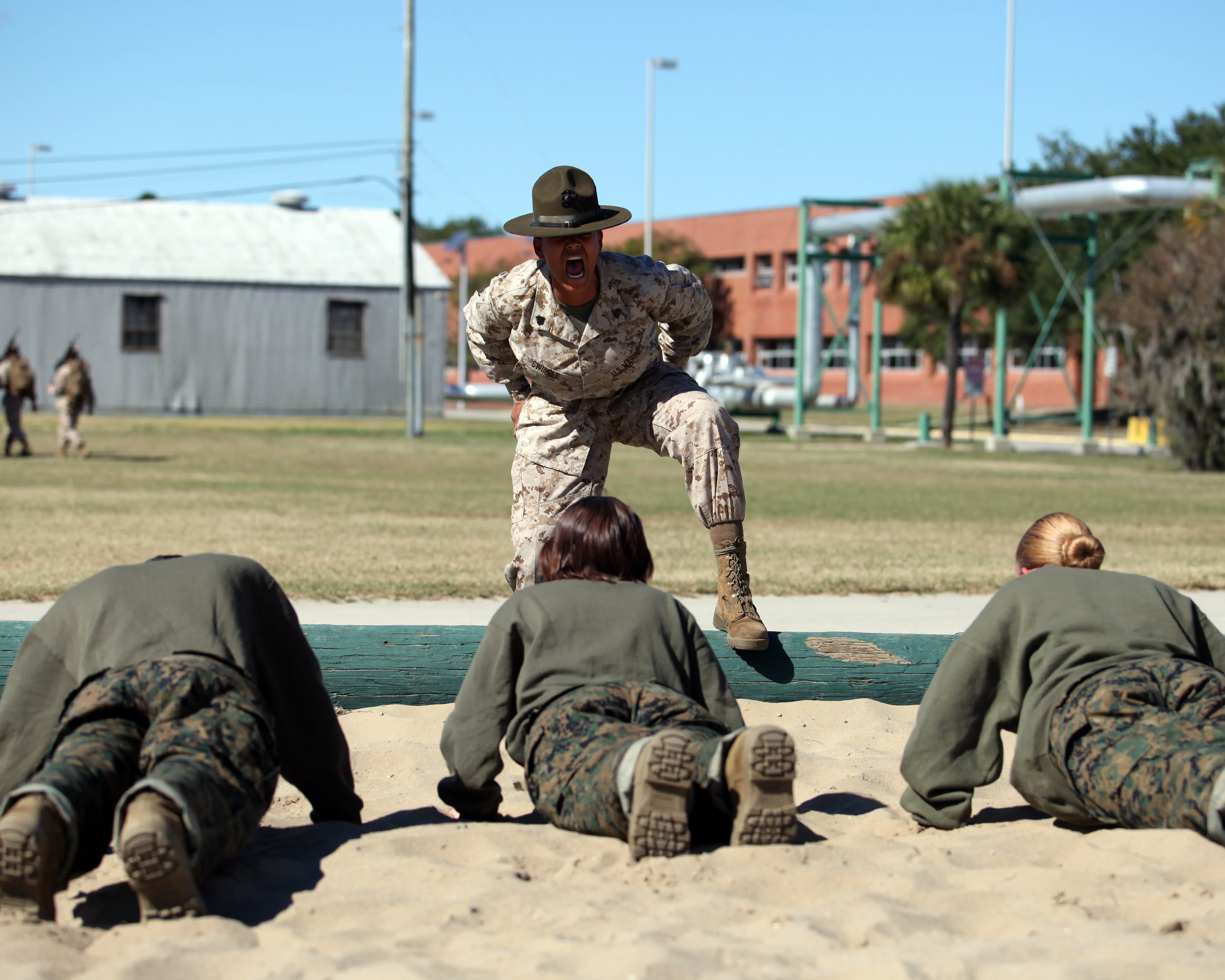
Sgt. Katheryn Swingle, a drill instructor with 4th Recruit Training Battalion, conducts incentive training to instill order and discipline during the first phase of recruit training aboard Marine Corps Recruit Depot Parris Island, S.C. IT consists of rigorous exercises like pushups, mountain climbers and crunches.
Photo Credit: Cpl. Aneshea Yee/Marine Corps
"So you can get ITed for having a zipper on the wrong side, because the drill instructor said it should be on this side and it's on the other side," she said. "So you say to them, 'Guess what, recruit? We know why the Marine Corps is the best - attention to detail. That's why we're the best. [I]f we go off to war, that's what's going to get you, that attention to detail.'"
1. They like you. Kind of.
Drill instructors get to know their recruits on a very personal level and are proud of seeing them earn their eagle, globe and anchor. Spending so much time with a young, impressionable adult, and transforming him into a Marine creates a connection, Thiroux said.
"You're theirs for three months, and a bond is created," she said. "They're growing because of what you're teaching them, and you take ownership of it," she said.
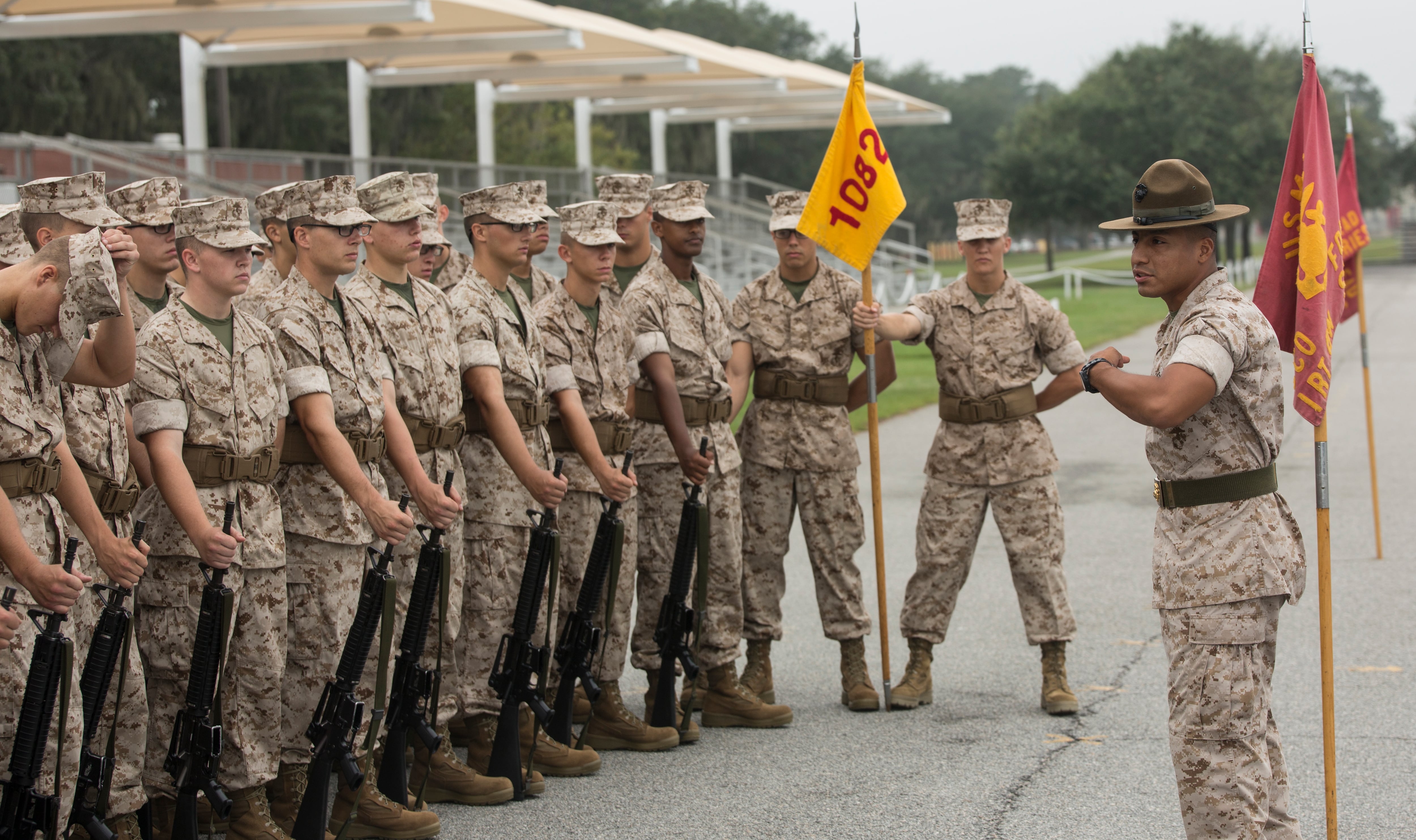
Sgt. Diego Hernandez motivates his recruits for their initial drill evaluation at Marine Corps Recruit Depot Parris Island, S.C.
Photo Credit: Cpl. David Bessey/Marine Corps
Kennedy noted that some recruits are shy while others show up ready to be loud. The DIs quickly pick up on those traits, he said, which might surprise recruits.
"A lot of times I can look at a recruit and I can recognize when they don't want to push on," he said. "We'll watch them."
Knowing that he's having a significant impact on the future of the Marine Corps makes the job important to him, Brennan said.
"With the training we give [recruits] throughout this cycle and the core values that we put in them, and then my twist — the little bit of myself I put into it —I feel like I'm molding my future replacement so I can give back to the institution," he said.





